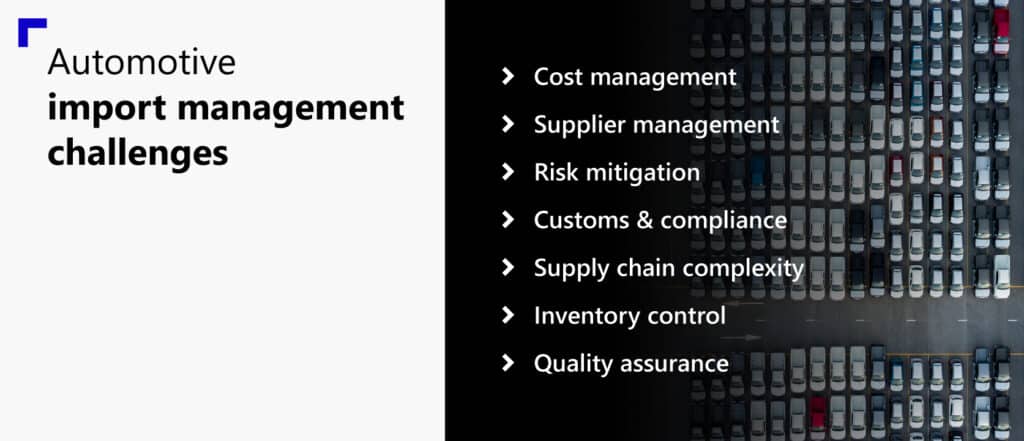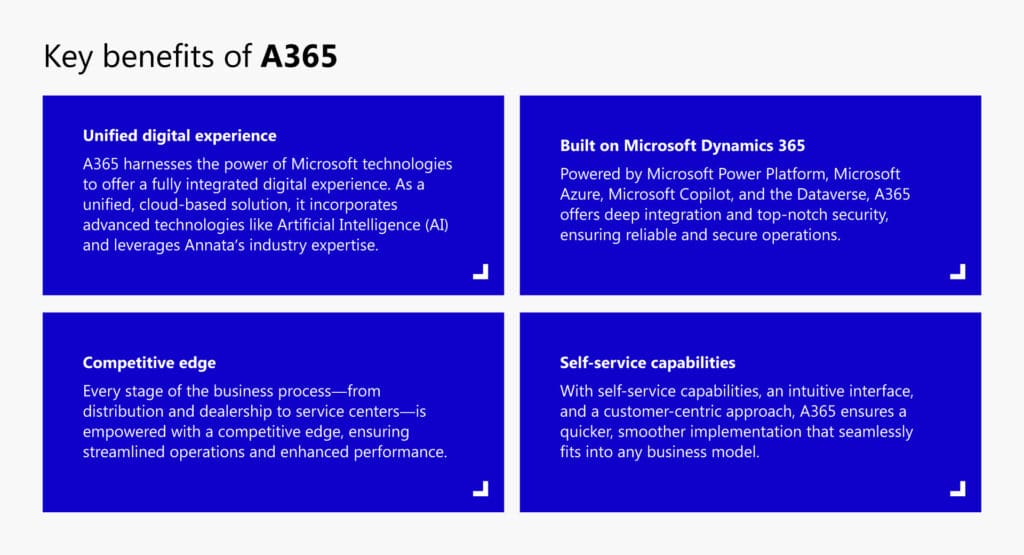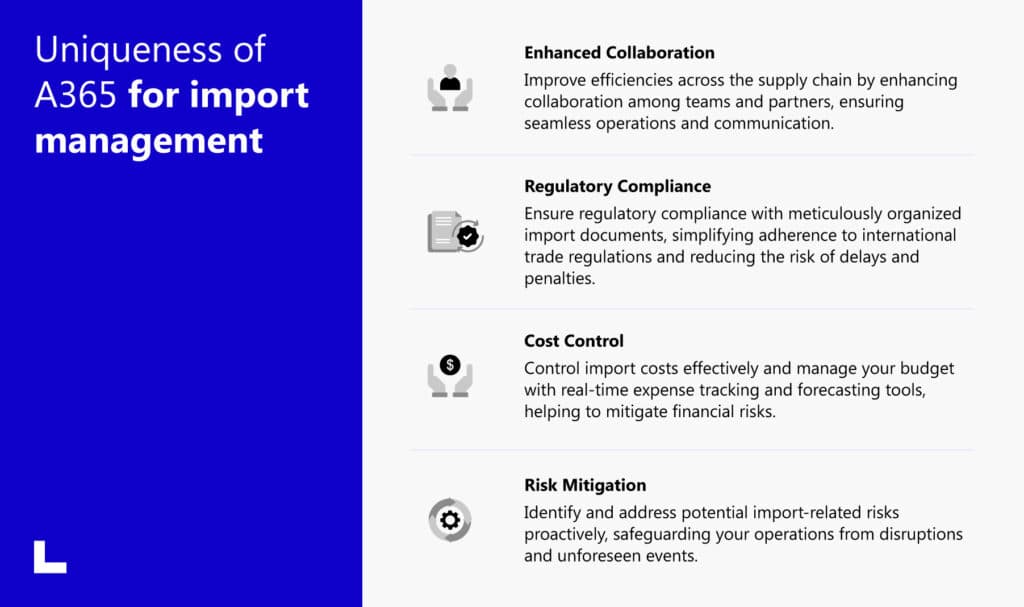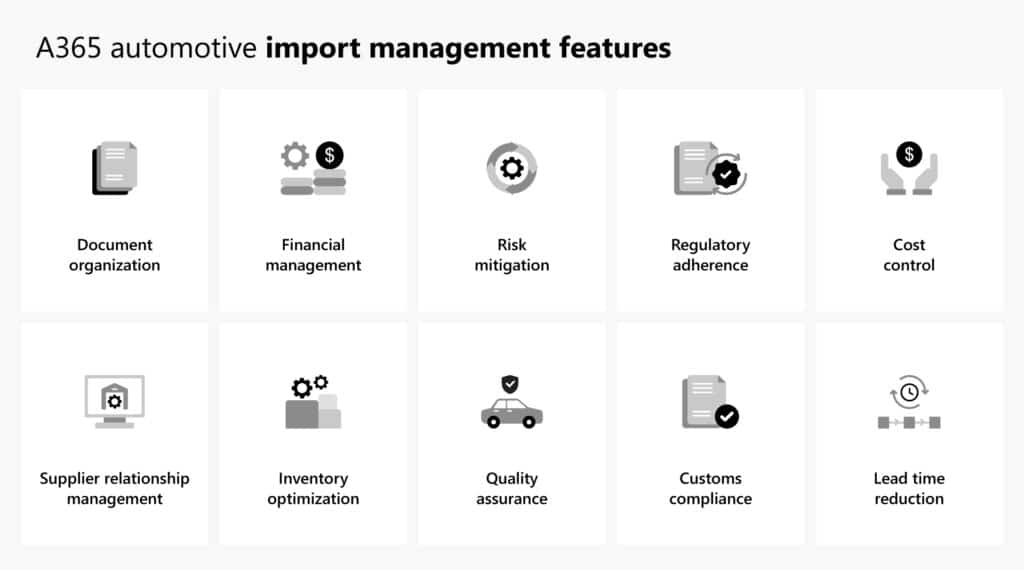In the fiercely competitive world of automotive businesses, managing imports isn’t just a necessity—it’s a crucial factor for maintaining seamless operations and securing a competitive edge.
In this blog, we’ll delve deep into the realm of automotive import management, uncovering the challenges you face and showcasing how A365 can propel your business forward. From streamlining collaboration with suppliers to ensuring regulatory compliance, we’ll demonstrate how A365 can enhance your business’s efficiency and competitiveness.
Let’s start by understanding some of the challenges around import management for automotive businesses. By the end of this blog, you’ll not only understand the critical challenges of automotive import management but also see how A365 can be the partner that propels your business to new heights of success in the competitive automotive industry.
Automotive import management challenges

- Cost management
One of the most significant challenges in import management is controlling costs. Automotive businesses must manage various expenses, including shipping, tariffs, duties, and warehousing. Fluctuations in currency exchange rates can also impact costs.
To manage these expenses effectively, businesses should:
- Implement robust budgeting practices: Regularly review and adjust budgets to account for changing costs.
- Negotiate better terms with suppliers and logistics providers: Secure favorable rates and terms to reduce costs.
- Use technology: Implement software to track and manage expenses in real-time.
- Supplier management
Automotive businesses rely on a complex network of suppliers to source parts and materials. Managing these relationships can be challenging, especially when dealing with international suppliers.
Key strategies include:
- Building strong relationships: Foster good communication and collaboration with suppliers.
- Diversifying suppliers: Reduce dependency on a single supplier to mitigate risks.
- Monitoring supplier performance: Use metrics to track supplier reliability, quality, and delivery times.
- Risk mitigation
Importing goods involves various risks, from geopolitical issues to natural disasters.
To mitigate these risks, automotive businesses should:
- Develop contingency plans: Prepare for disruptions with alternative sourcing strategies.
- Invest in insurance: Protect against potential losses due to unforeseen events.
- Stay informed: Keep abreast of global events that could impact supply chains.
- Customs & compliance
Navigating customs regulations and ensuring compliance with international trade laws can be daunting. Non-compliance can lead to delays, fines, and even legal issues.
To manage customs and compliance effectively:
- Understand regulations: Stay updated on the latest customs regulations in all relevant countries.
- Work with experts: Hire customs brokers or consultants to navigate complex regulations.
- Automate compliance processes: Use software to ensure documentation and processes meet all regulatory requirements.
- Supply chain complexity
The automotive supply chain is inherently complex, involving numerous stakeholders and processes.
To manage this complexity:
- Streamline processes: Simplify and standardize procedures where possible.
- Use integrated systems: Implement software that integrates various aspects of the supply chain for better visibility and control.
- Collaborate with partners: Foster collaboration across the supply chain to improve coordination and efficiency.
- Inventory control
Maintaining optimal inventory levels is crucial for meeting demand without overstocking. This balance is challenging, especially with fluctuating demand and long lead times.
To improve inventory control:
- Use demand forecasting: Implement tools to predict future demand accurately.
- Adopt just-in-time (JIT) practices: Minimize inventory levels by receiving goods only when needed.
- Monitor inventory levels: Use real-time tracking systems to manage inventory efficiently.
- Quality assurance
Ensuring the quality of imported parts and materials is critical to maintaining product integrity and customer satisfaction.
Quality assurance challenges can be addressed by:
- Setting quality standards: Establish and communicate clear quality requirements to suppliers.
- Conducting inspections: Regularly inspect imported goods to ensure they meet quality standards.
- Implementing quality management systems: Use systems that track and manage quality throughout the supply chain.
Overcoming import management challenges with A365
Managing import challenges can be daunting, but an industry-specific solution like A365 can simplify the process. A365 is a comprehensive solution that offers seamlessly integrated, industry-specific capabilities out-of-the-box, future-proofing business operations and delivering enhanced functionality.
Designed with adaptability, agility, and usability at its core, A365 revolutionizes business operations by eliminating segmented business systems and connecting previously siloed processes. This ensures an effortless, intuitive user experience.

Uniqueness of A365 for import management
A365 is built with complete, industry-specific functionalities that allow for easy updates, integrations, and customizations. This makes it a flexible and manageable solution that can grow with your business. A365 is built on Microsoft Dynamics 365 and utilizes Microsoft Power Platform, Microsoft Azure, Microsoft Copilot, and the Dataverse. This ensures deep integration and top-notch security.
Leveraging the power of Microsoft technologies and Annata’s industry expertise, we provide automotive businesses with a unified solution that addresses every stage of their value chain. A365’s import management capabilities are meticulously crafted to meet your business’s specific import management needs, ensuring seamless integration, enhanced efficiency, and streamlined operations.

A365 automotive import management features
A365’s import management feature is an all-encompassing tool that addresses every facet of the import process, providing comprehensive support to simplify and streamline operations while ensuring compliance with international standards. This platform enhances communication between management teams and global partners, facilitating smooth international collaboration and efficient import operations.
By leveraging A365’s suite of features, automotive import operations can achieve unparalleled efficiency and compliance, ensuring smooth and successful import management from start to finish.

Key features of A365 for automotive import management include:
- Document Organization Ensure regulatory compliance with meticulously organized import documents. This feature simplifies adherence to international trade regulations, reducing the risk of delays and penalties.
- Financial Management Control import costs effectively and manage your budget with real-time expense tracking and forecasting tools, helping to mitigate financial risks.
- Risk Mitigation Identify and address potential import-related risks proactively, safeguarding your operations from disruptions and unforeseen events.
- Regulatory Adherence Stay compliant with international trade laws and customs regulations through automated processes and expert guidance, minimizing the risk of non-compliance.
- Cost Control Optimize cost management by negotiating better terms with suppliers and logistics providers. Utilize technology to monitor expenses in real-time for greater financial efficiency.
- Supplier Relationship Management Build and maintain strong relationships with suppliers, ensuring reliability and quality throughout your supply chain.
- Inventory Optimization Maintain optimal inventory levels with advanced demand forecasting and just-in-time practices, reducing the risk of overstocking or stockouts.
- Quality Assurance Implement robust quality assurance processes to ensure that imported parts and materials meet your standards, preserving product integrity.
- Customs Compliance Navigate customs regulations with ease using automated compliance processes and expert support, ensuring smooth and timely imports.
- Lead Time Reduction Reduce lead times by streamlining processes and improving coordination across the supply chain, ensuring timely delivery of goods.
Discover the advanced import management capabilities of A365 here. Connect with us for a personalized session and explore how A365 can seamlessly address your business’s import management challenges.








